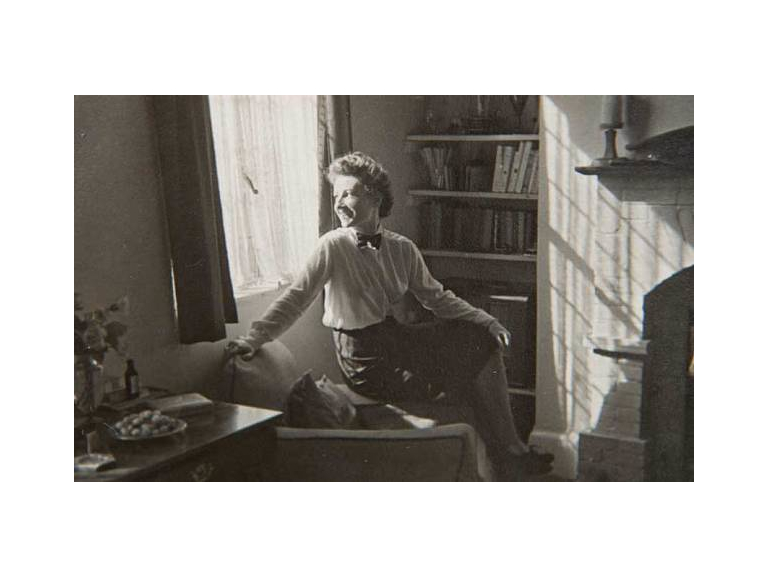
Security chiefs laughed off stories of a beautiful blonde employed as an ‘agente provocatrice’ to tempt British trainee spies into giving away secrets.
Almost 70 years later, Fifi’s existence has been confirmed and her identity disclosed. She was Marie Christine Chilver, hired at 22 by the wartime Special Operations Executive and employed in a role so covert that it was known to only a handful of people.
After retiring from the service, she lived an anonymous life in the Forest of Dean, devoting her time to animal welfare and tending her garden. She died in 2007.
Her extraordinary tale was disclosed in documents released by the National Archive. They describe a young woman with “quite unusual gifts of intelligence, courage and assessment of character”, possessed of "striking" good looks, who was an invaluable asset to Britain’s war effort.
Posing as a French journalist – she was fluent in several European languages - she was tasked with charming young trainees and engaging them in conversation over drinks or dinner, gaining their confidence and extracting information from them. The reports she wrote decided whether the trainees could be trusted on foreign assignments, and for some she was their downfall.
One would-be agent from Belgium, well-regarded by his instructors, was dismissed after spending a day in Chilver's company. “By the evening,” she wrote in one of her meticulous reports, “I had learnt practically all there was to know about him.”
Jonathan Cole, researcher at the National Archives, said: “Fifi was somewhat of a legend of the Special Operations Executive. Until now, her existence and the deployment of her services had been dismissed.
“With the release of her file, her identity, impressive skills and the important role she played in Second World War secret operations is now finally revealed.”
Chilver, who went by her middle name of Christine, was born in London but grew up in her mother’s native Latvia, where she was privately educated at a German school in Riga.
She studied at the Sorbonne in Paris, and when war broke out was interned at Besançon. She escaped and made her way to the UK in 1941, along the way helping a wounded RAF serviceman. He suspected she was a German agent and described her as "one of the most expert liars in the world".
But she was checked out by SOE, who found she harboured no German sympathies and would be good agent material. In 1942 she offered her services “for active work under conditions of danger”, according to her file.
Her role was known to only three people because, in the words of her superior, “the English public was very sensitive to the idea of people snooping”.
Trainee agents were placed on 96-hour undercover assignments around Britain, and Chilver was sent there to test them. Her instructions included where she should bump into them and a brief description. One target in Newcastle was described as having “uneven front teeth, large feet… carrying a Penguin novel”.
The job was far from glamorous: Chilvers noted wryly in one of her reports that her hotel consisted of “plush curtains, fried fish smell and aspidistras”. Despite the serious nature of her work, humour was a feature of her correspondence with superiors. Dispatching her to Wolverhampton, her boss wrote: “A room will be booked for you at the Victoria Hotel, which is the only hotel, and a very bad one at that, in that revolting town.”
She wrote of one "pick-up" at the Midland Hotel in Birmingham: "Parker never showed any signs of suspicion at all with the possible exception of refusing (rather apologetically) to mention the name of his training school.”Throughout the conversation he does not seem to have been aware that he was being questioned methodically and maliciously, although I tried to make it as obvious as possible."
At times, Chilver wondered whether her work was "distasteful" but concluded that it was important and would help the trainees to "outwit all the Fifis they are likely to meet in their future career... Compared to what is most likely to happen in the field, it is very mild and innocent."
After leaving the service, Chilver lived first in Chelsea, west London, and latterly in Lydney, Gloucestershire, close to the Welsh border. She spent her last decades with her companion, Jean ‘Alex’ Felgate, who died in 2011.
Hugo Whatley, current occupier of the house, said: “Alex and Christine lived here together. I believe they met during the war and that Alex may also have been in the SOE.
“Their garden was extraordinary. They had so many plants here. It’s run-down a little now but you still find the odd wonderful plant they planted. After what they went through in the war, I think this was a way for them to get away.”
Chilver’s file is one of more than 3,000 Second World War intelligence records made available online on the National Archives website.
Article courtesy of the Telegraph 17.09.14
I have lived in Abergavenny for 6 years and love the town. I never get tired of walking up Nevill Street and seeing those dramatic hills loom up in front of me! Abergavenny has a friendly atmosphere and...
The following Cookies are used on this Site. Users who allow all the Cookies will enjoy the best experience and all functionality on the Site will be available to you.
You can choose to disable any of the Cookies by un-ticking the box below but if you do so your experience with the Site is likely to be diminished.
In order to interact with this site.
To help us to measure how users interact with content and pages on the Site so we can make
things better.
To show content from Google Maps.
To show content from YouTube.
To show content from Vimeo.
To share content across multiple platforms.
To view and book events.
To show user avatars and twitter feeds.
To show content from TourMkr.
To interact with Facebook.
To show content from WalkInto.